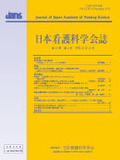Japanese
English
- 販売していません
- Abstract 文献概要
- 参考文献 Reference
- サイト内被引用 Cited by
要旨
目的:CNSにおける職務上の自律性に影響を及ぼす要因を明らかにすることである.
方法:CNS認定者545名を対象にして質問紙調査を実施した.質問紙は,CNS自律性測定尺度と職位,看護専門分野,仕事に対する自信や意欲,満足感,キャリア意識,職場の人間関係,サポート認知を尋ねる項目で構成した.分析には,t検定,偏相関,重回帰分析を用いた.
結果:回答者212名(38.9%),有効回答205名(96.7%).“他職種間調整・管理運営相談能力”は,スタッフよりも主任・係長以上,急性・重症看護よりもがん看護と精神看護,サポート認知低得点群よりも高得点群の方が高かった.“クリティカルケア・総合判断能力”は,精神看護よりもがん看護,慢性疾患看護,急性・重症看護の方が高かった.また,職務経験年数の多さにかかわらず自信,意欲,満足感,キャリア意識,職場の人間関係が関連性を示した.中でも自信や意欲,職場の人間関係は,CNS自律性下位尺度項目のすべてに強い影響力を持っていた.
結論:CNSの自律性形成には,専門性を発揮するための職務上の地位,良好な人間関係とサポートが得られる職場環境,仕事に対する自信や意欲に配慮する必要性が示唆された.
Objective: To investigate the influence of various factors on the development of professional autonomy in certified nurse specialists (CNSs).
Method: We conducted a questionnaire survey on 545 CNSs. In addition to CNS Autonomy Measuring Scale, the questionnaire included CNS-related items on the following: job positions; specialty fields; confidence towards the profession; eagerness towards the profession; sense of satisfaction; career awareness; human relations in the workplace; and support recognition. For comparisons, we used t-test, partial correlation, and multiple regression analyses.
Results: Among the 545 CNSs surveyed, responses were received from 212 (response rate: 38.9%), among which 205 were valid (valid response rate: 96.7%). Scores for “collaboration with other specialists and consultation ability in management” were higher in executive and managerial CNS posts, such as Chief/Manager, than in staff; in both cancer and psychiatric mental health nursing CNSs than in critical care nursing CNSs; and in CNSs with higher as opposed to lower scores in support recognition. Scores for “critical care management and general judgment ability” were higher in cancer nursing, chronic care nursing, and critical care nursing CNSs than in psychiatric mental health nursing CNSs. In addition, strong associations were observed between confidence towards the profession, eagerness towards the profession, sense of satisfaction, career awareness, and human relations in the workplace, irrespective of the nursing field or the number of years of working experience. Moreover, confidence, eagerness, and human relations in the workplace were shown to have a strong influence on all lower level items of the CNS Autonomy Measuring Scale.
Conclusion: Our results suggest that confidence and eagerness towards the profession are essential for promoting the development of autonomy in CNSs. In addition, these results suggest that professional positions should enable CNSs to exhibit their specialties, and that the workplace environment should provide adequate support and maintain good human relations.
Copyright © 2014, Japan Academy of Nursing Science. All rights reserved.


